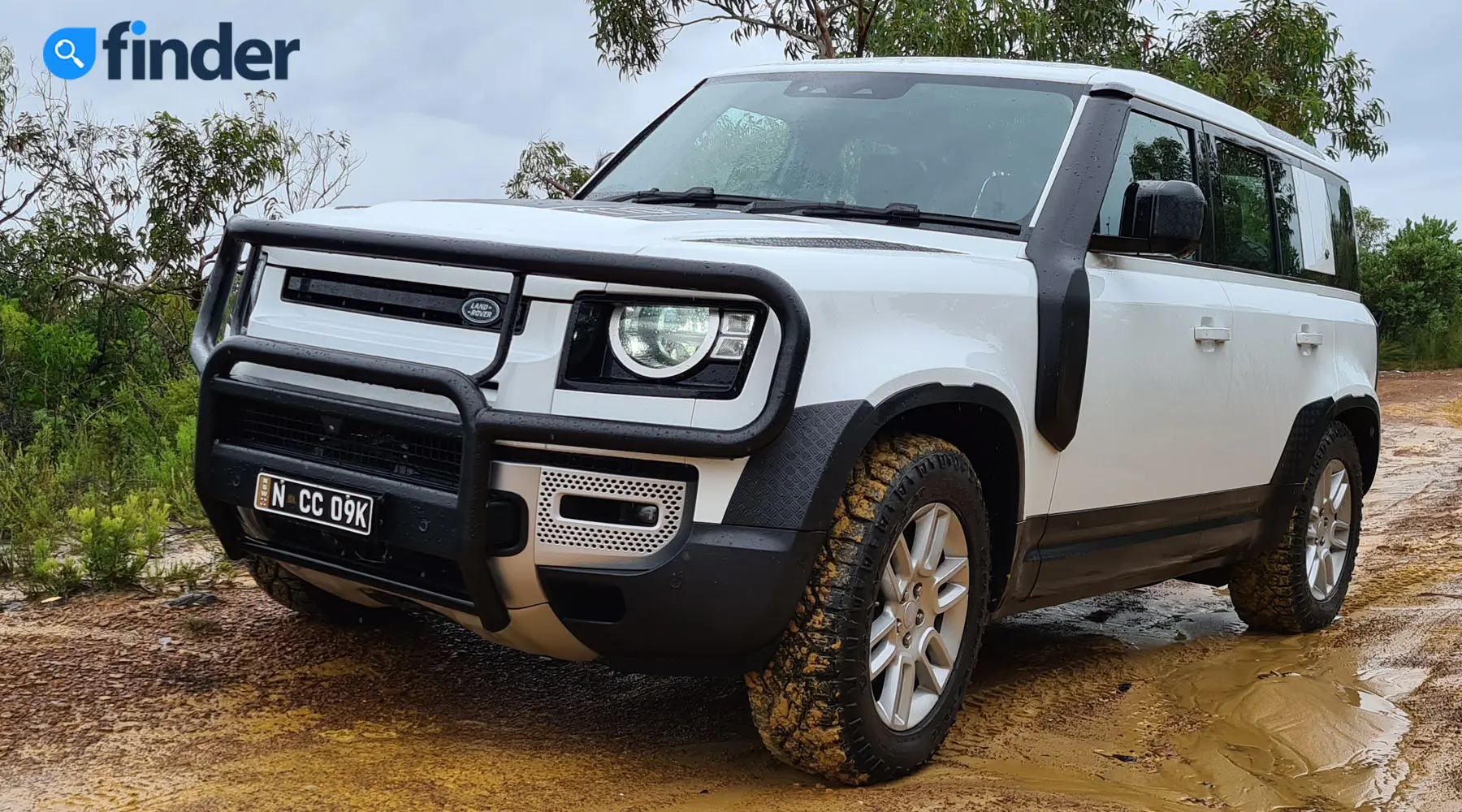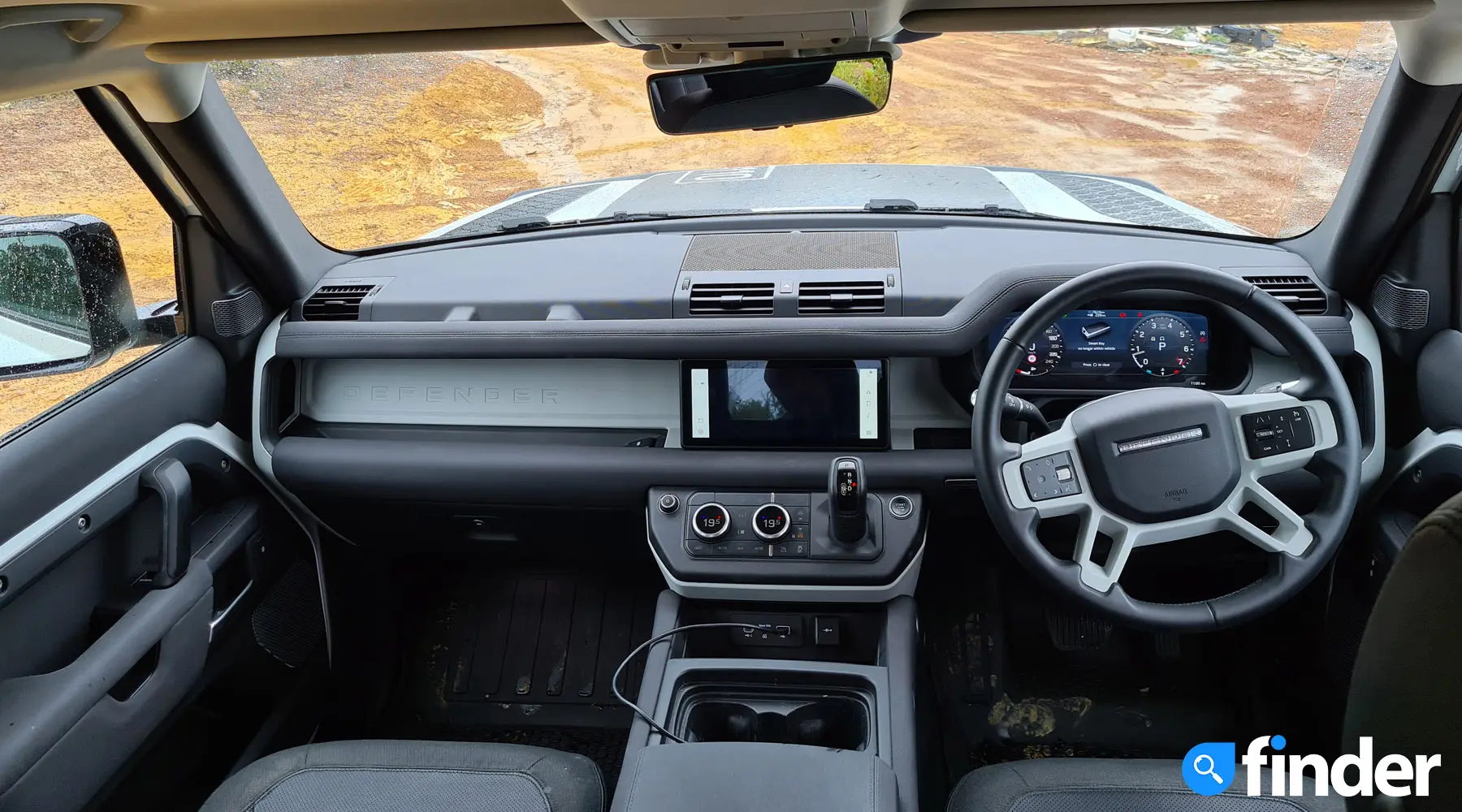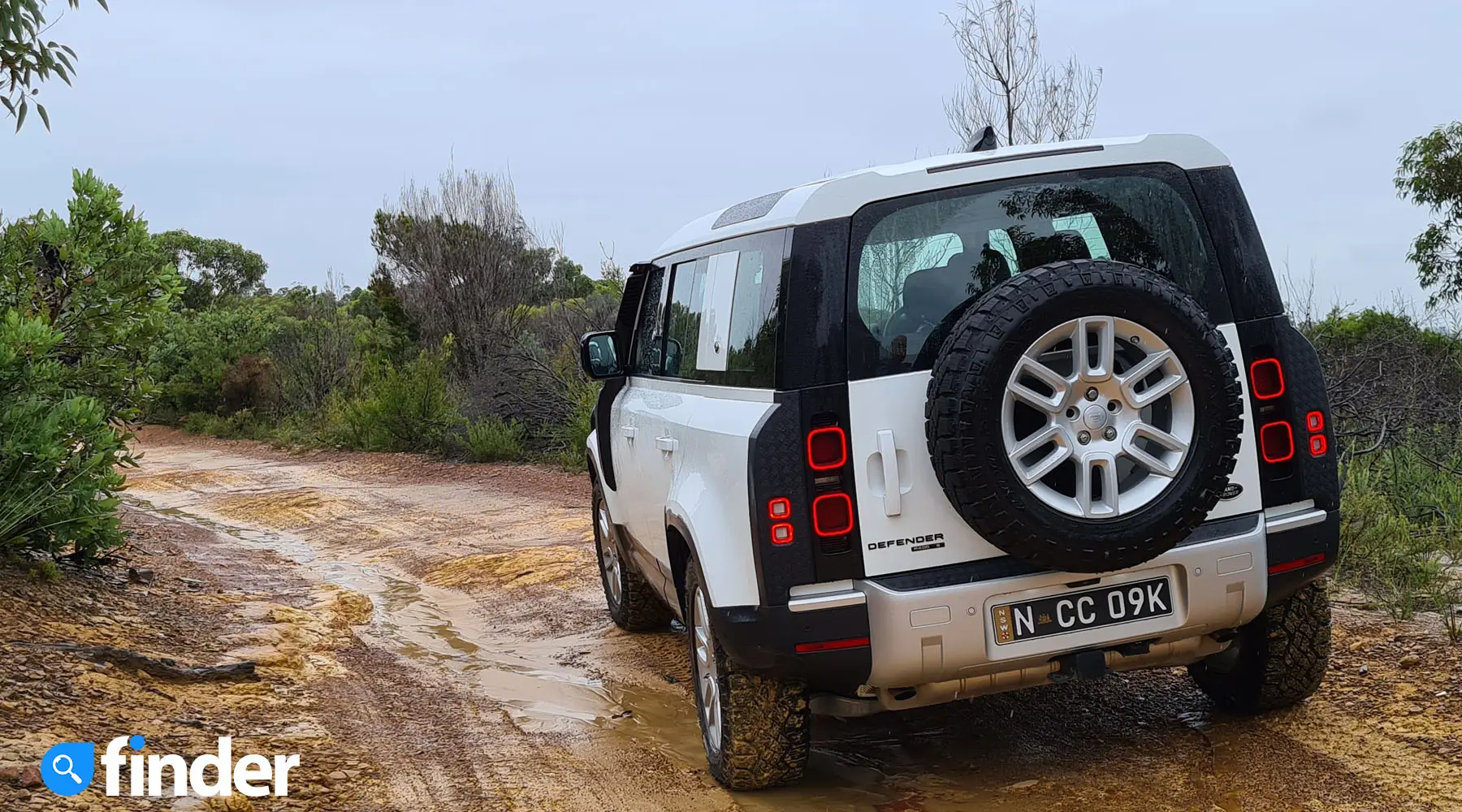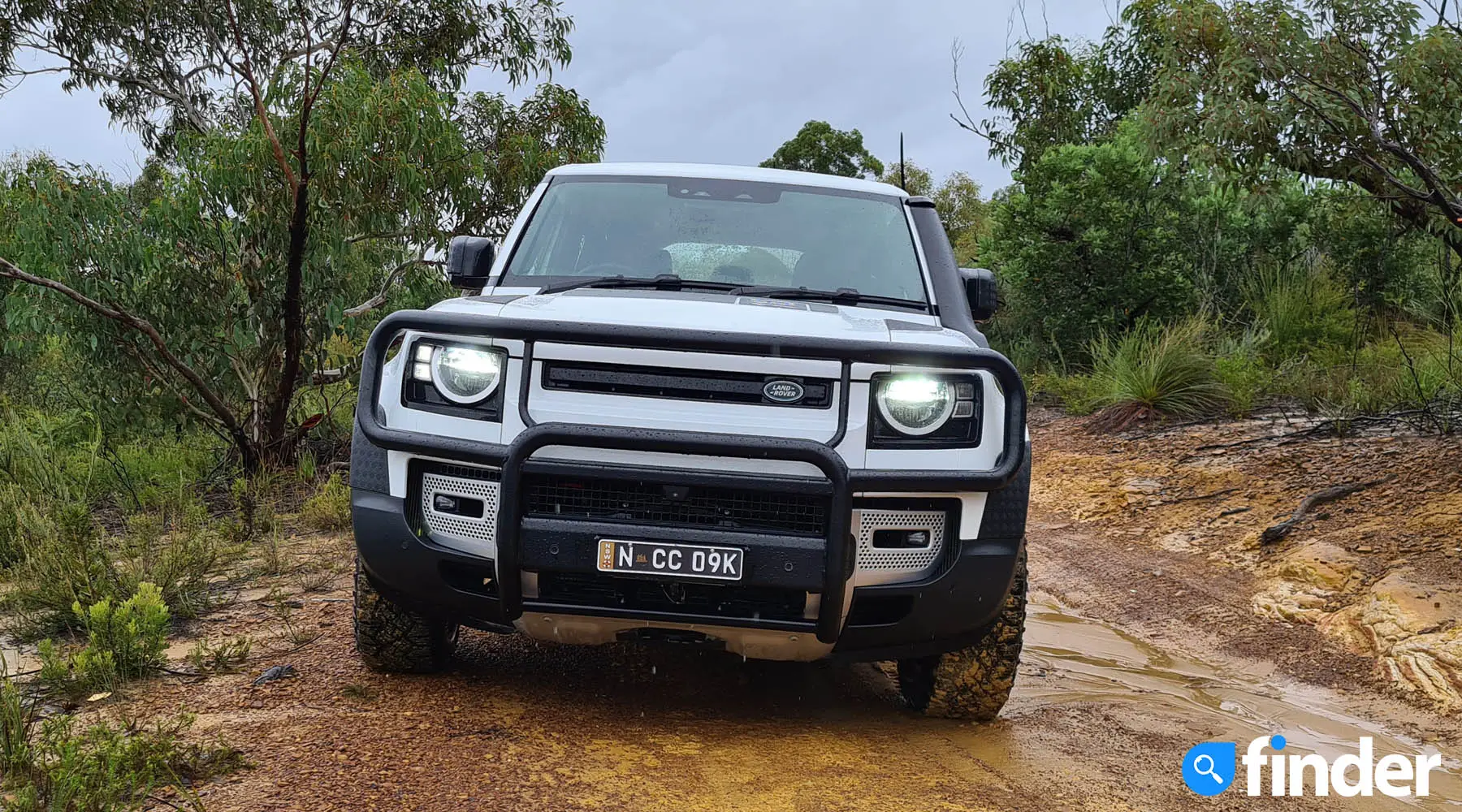
As we recover from the recent heavy rainfall that brought flooding to basically all of eastern New South Wales, I couldn’t help but think that if I could be in any car right, it would have to be this Land Rover.
Not to make light of the situation, as it is terrible, but the Land Rover Defender 110 has the ability to wade through almost a meter of water. It can also stay submerged for over an hour without any issues. These two qualities become desirable as the water levels rise – on the roads.
This Land Rover Defender 110 is the P400 S, meaning it is the entry level P400, and starts life at $95,335.
This one rolled off the assembly line with a number of options and local accessories bolted, though.
Factory accessories like the bullbar ($4,495), Chequer Plate Body Protection Kit ($940) and the bonnet decal ($280) give this off-roader a Mad Max-type look. They also escalate the grand total quickly. This Defender comes in at $118,817, before on-road costs.
What’s it like inside?
The first thing you notice when jumping up into the Defender 110 is just how much headroom there is. Seriously, they could have fitted overhead luggage compartments and you still wouldn’t hit your head.
Being an earth-conquering Land Rover Defender (especially in this spec, with these options), it is built to withstand conditions that your average vehicle simply couldn’t. As such, the interior matches the vehicle’s off-road credentials and rugged exterior.
You can more or less wipe every surface clean and not have to worry. It is wrapped in Ebony Grained Leather with the seats also getting “Robust Woven Seat Facings” which in truth will probably be the hardest thing to keep clean on this particular vehicle.
If you are planning to get the car dirty you might want to look at the deep-sided rubber mats (a $280 option). These mats were present during our test and were really easy to clean, simply hit them with the hose, just like the old Defender

Seating in the front is semi-powered. You manually adjust the seat position, but once it settles in place, you have 12-way adjustment. Once you’re comfortably set up, you have a push-button start to bring the Defender to life. A leather-wrapped steering wheel houses all your trip computer and infotainment controls.
A large digital cluster sits behind the wheel and brings up all the information you need, including navigation. You also have a 10-inch touchscreen front and centre of the dashboard, controlling everything from the DAB radio and Android Auto or Apple CarPlay, to the various off-road and terrain settings.
Screen and software are both sharp, responsive and well laid out – you shouldn’t have any issues getting up to speed with it.
Dual-zone climate control is easy to set up and you also get ample (and I mean AMPLE!), charging points throughout the vehicle with no less than six USB ports, a USB-C and three 12-volt sockets in the cabin (not to mention the one in the cargo area).
As you can probably guess, the knee and head room in the back are plentiful too.
2020 Land Rover Defender 110 boot space
Storage space measures in at 1,075 litres with the second row in place and a whopping 2,380 litres with the second row folded flat. You access the space via the door-like tailgate that is hinged on the right hand side, a nice carryover from the classic models.
As mentioned, there is a 12-volt socket in the back too, along with durable flooring.
What’s the Land Rover Defender like to drive?
Despite its substantial heft, the Defender is actually surprisingly easy to maneuver around. Steering is well weighted, and in tight situations it isn’t going to tire you out.
Then, once you are out of your parking predicament and on to the open road, you see that this Defender is bloody fun to drive. Not something I thought I would be saying. This is no doubt thanks to the new independent suspension and adaptive dampers that keep the Defender feeling connected to the road.
It is built on what has been called the D7x chassis. It is similar to the D7 chassis that underpins larger Range Rovers, but much more “extreme”, hence the “x”.
Despite the size of the Defender, it drives and moves as though it is much smaller. There is some body roll, as is expected, but probably less than you would imagine. You really need to throw it into a corner to feel any significant tilt.
Then there is the engine, which is brilliant. The 3.0-litre turbocharged in-line six petrol engine produces a considerable 293kW and 550Nm of torque and is matched to an 8-speed automatic gearbox. It gets up and goes quickly, possessing enough power on tap at any time to overtake, if you should so need.

My favourite thing about this particular 2020 Defender though was how it sounded. I found myself driving with the windows down most of the time. With the $1,422 optional Raised Air Intake (snorkel), you can hear air being sucked into the engine. With your foot down you can almost hear the engine bellowing “I’m breathinggg!”
If the plan is to hitch up a caravan, it will tow 3.5 tonnes with a maximum towball weight of 350kgs, which is good when it comes to towing. For reference, that is the same as a V8 Nissan Patrol or a 70 and 200 series LandCruiser. To tow more you would need to look towards a RAM 1500 Express, which can tow 4.5 tonnes and has a towball weight of 450kgs.
It is probably a good idea to option the Towing Pack if this is how you plan to use the Defender. It will set you back $3,702, but adds Advanced Tow Assist, a tow hitch receiver, Configurable Terrain Response, Terrain Response 2 and All Terrain Progress Control systems.
The spacious cabin is quiet for the most part, but you do get some tyre noise at motorway speeds, as is to be expected with off-road tyres fitted. But you’ll want those if you are planning to use the Defender 110 to its full capability.
2020 Land Rover Defender off-road credentials
Given the torrential rain that Sydney saw, we thought it best not to carry out our plans to take the Defender off-road. There was just no way of telling how degraded the track may have been one or two kilometres ahead, in which case we may have had to reverse all the way back.
With that being said, there is no doubting its off road credentials.
It can wade through 700mm of water with the suspension set as standard. Raise the air suspension with the push of a button and you can wade to a depth of 900mm, almost a metre! Should you get stuck in fresh water, it can stay there for up to an hour thanks to the vehicle's electronics being designed to IP67 water immersion standards.
Cameras and sonar are also on hand when you’re travelling through water, or just off-road in general, to make sure you aren’t driving into anything laying on the bottom that may be troublesome. That could come in handy as drain hole covers can wash away during flooding.
Impressive approach and departure angles allow the 2020 Land Rover Defender to climb steeper terrain too. A 38-degree approach and a 40-degree departure angle should stop the front and rear of the car scraping most of the time. Meanwhile, a 28-degree ramp-over angle gives it a good chance of avoiding beachings too.

Locking rear and centre diffs can be activated based on the terrain, and as mentioned, there is a terrain mode to suit whatever you are tackling.
Adding further to this beast's off-road prowess was the remote control electric winch (which costs $4,950).
How safe is it?
The 2020 Land Rover Defender 110 comes with a solid amount of safety as standard, however not all the ones you may expect are there across the board.
With nothing added, you will have, among other things:
- Autonomous emergency braking
- Lane keep assist
- Traffic sign recognition with an active speed limiter
- 360-degree camera
- Tyre pressure monitors
If you want more driving aids, you are going to want to purchase the Driver Assist Pack, which adds $2,086 to the overall price. The package brings technology like:
- Blind spot monitoring
- Adaptive cruise control
- Rear collision monitors
- Rear cross-traffic alert
While it's not an insignificant sum, the technology included is going to make your life easier and your trips safer, so it is worth considering. That said, for a vehicle at this price point, I do wonder if they should be included as standard.
You can also go a step further and option the ClearSight Interior Rear-View Mirror. This new mirror doubles as a screen at the flip of a switch, projecting what is behind you, as a traditional mirror does, but through a camera mounted to the roof of the vehicle.
It costs $1,274 but price aside, I wouldn’t opt for this. It is fun and futuristic, but on the go, I found it a little disconcerting and switched it back instantly.
The verdict
Land Rover has created another supremely capable off-road SUV but has also added a level of refinement making the Defender 110 easy to live with off-road and around town.
If around town is where you are going to be doing your driving though, you’ll probably be happy with a Range Rover. But if you do plan on heading off-road, this is the 4x4 you want.
Want to read more car reviews? Check out our car reviews section, or, if you already know what you're after, it might be worth comparing car loan options as well as car insurance to see how much you could save.
More guides on Finder Shopping
-
Hyundai Ioniq 5 N Review
The future’s electric – and it wants to burn rubber
-
2025 Genesis G70 Review
It's faster than a BMW 3 Series, more unique than a Mercedes C-Class and loaded with features that make it feel every bit as premium.
-
Volkswagen Golf Mk8.5: More tech, more power, more excuses to upgrade?
The VW Golf is back - and it's got more of everything.
-
Sharper, smarter and better value: The 2025 Skoda Octavia RS lands in Australia
Skoda refines its family-friendly performance car with more features, more power and a competitive price.
-
2024 Peugeot E-Expert Van Review
Peugeot have made a van that whispers while it works.
-
2024 Toyota GR Corolla review
Toyota gave a Corolla muscles and a megaphone and it’s glorious.
-
2024 Jeep Wrangler Review
Born for the trail, adapted for the tarmac
-
SUV reviews
Let us assist you in picking your next SUV.
-
Best small cars
There are dozens of different makes and models to choose from and then about five different trim levels on average, per carmaker. This guide will help you cut through the sales banter.
-
Electric Car Reviews 2025
Which electric car should you buy in 2021? Find out with our complete EV guide.
